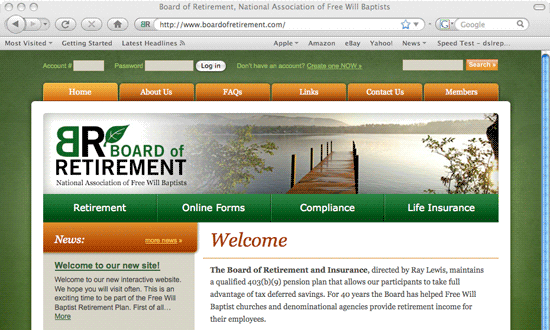
Exciting changes are taking place at the Free Will Baptist Board of Retirement.
change is in the air
By D. Ray Lewis
Some look at change as bad. They have the attitude, “If it isn’t broken, don’t fix it.” More often than not, however, change is good. A prime example is the exciting changes taking place at the Board of Retirement.
First, the new interactive website, www.boardofretirement.com, was launched at the national convention. The site is part of on ongoing effort to provide participants with information and tools to help them with retirement planning.
Participants can now access their individual retirement account. Information is updated nightly with current account balances and recent account activity.
The site also contains current news feeds with happenings relating to retirement pension plans. Many current forms and documents can be downloaded and printed for use by the participants. Some forms are interactive and can be completed online, giving us updated current information much faster than ever before.

The website is not the only change taking place at the Board of Retirement. History was made on March 24, 2009, when the Board of Trustees voted to make two major changes to the Free Will Baptist pension plan.
The first change deals with earnings allocations. We will change from semi-annual to monthly allocations of earnings or losses. This change went into effect July 1, 2009. Once this change went into effect, all participant withdrawals, transfers, rollovers, or any other settlements are calculated according to the last day of the calendar month within which the participant’s withdrawal, transfer, or other settlement decision is made.
Using new software, the Board will issue monthly electronic retirement fund statements to all participants who provide current email addresses. We will continue, however, to mail semi-annual statements.
The second Plan change adopted by the board addresses the issue of investment options. For the first 40 years of our existence, plan participants have been limited to one investment option. Historically, this option has done very well, and we believe that in spite of the current economic crisis will continue to do so. Our life-to-date average return is 7.53%.
In recent years, however, more and more participants have requested additional options for their investments. The Board heard those requests and has approved an additional investment option.
The staff was directed to implement a second, more conservative investment option, as soon as practicable, and no later than January 1, 2010. The new option will be available to all participants, but the board made their decision primarily for the benefit of the participants who are approaching retirement.
The newly-created fund will be managed by our longtime investment managers, Manning and Napier Advisors. This fund will be managed and invested under different and more conservative directives and policies than the current portfolio.
The original option will continue to be the default option for those who do not direct all or part of their funds to this new option.
In light of the present economy, some participants may be tempted to abandon the long-standing option that has done well in the past and move to the more conservative option. Making radical changes in investments during the financial roller coaster we have been experiencing lately is seldom a wise move. What happens if you are out of the market and the market goes up? Making changes based on short-term market movements is almost a guarantee for failure as it promotes “buying high and selling low.”
Experience has shown that a disciplined and measured approach is the most prudent means of achieving positive long-term investment results. We are confident that this approach will continue to serve our participants’ retirement needs.
Sometimes change is necessary. A new interactive website, revised earnings allocations, and a new investment option—all positive changes for an already good program.
About the Writer: D. Ray Lewis joined the Board of Retirement in 1982. He became the director in 2005 after serving for several years as the assistant director.
|

